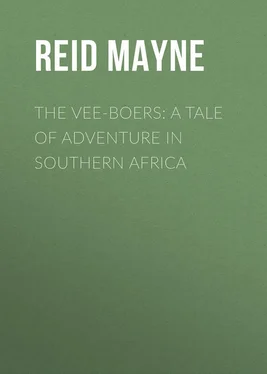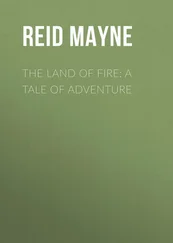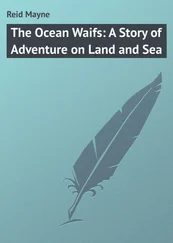Mayne Reid - The Vee-Boers - A Tale of Adventure in Southern Africa
Здесь есть возможность читать онлайн «Mayne Reid - The Vee-Boers - A Tale of Adventure in Southern Africa» — ознакомительный отрывок электронной книги совершенно бесплатно, а после прочтения отрывка купить полную версию. В некоторых случаях можно слушать аудио, скачать через торрент в формате fb2 и присутствует краткое содержание. Жанр: foreign_prose, foreign_children, на английском языке. Описание произведения, (предисловие) а так же отзывы посетителей доступны на портале библиотеки ЛибКат.
- Название:The Vee-Boers: A Tale of Adventure in Southern Africa
- Автор:
- Жанр:
- Год:неизвестен
- ISBN:нет данных
- Рейтинг книги:4 / 5. Голосов: 1
-
Избранное:Добавить в избранное
- Отзывы:
-
Ваша оценка:
- 80
- 1
- 2
- 3
- 4
- 5
The Vee-Boers: A Tale of Adventure in Southern Africa: краткое содержание, описание и аннотация
Предлагаем к чтению аннотацию, описание, краткое содержание или предисловие (зависит от того, что написал сам автор книги «The Vee-Boers: A Tale of Adventure in Southern Africa»). Если вы не нашли необходимую информацию о книге — напишите в комментариях, мы постараемся отыскать её.
The Vee-Boers: A Tale of Adventure in Southern Africa — читать онлайн ознакомительный отрывок
Ниже представлен текст книги, разбитый по страницам. Система сохранения места последней прочитанной страницы, позволяет с удобством читать онлайн бесплатно книгу «The Vee-Boers: A Tale of Adventure in Southern Africa», без необходимости каждый раз заново искать на чём Вы остановились. Поставьте закладку, и сможете в любой момент перейти на страницу, на которой закончили чтение.
Интервал:
Закладка:
Adding to their spectral appearance were the long, withered grass-tufts and karoo bushes, white as if coated with hoar frost. These concealing their stride, they seemed to glide along as boats upon water, propelled by some invisible agency, acting underneath.
To the Vee-Boers, as much hunters as herdsmen, it was a tempting, tantalising sight, and under other circumstances the silence of the night would have been broken by the cracking of shots. But they knew that to attack the elephants might infuriate and bring them in charge upon the waggon-train, which would surely be its destruction. 5 5 Elephants often march in single file – indeed, it is their common way – the sagacity of these animals telling them they are thus less exposed to danger. Often, too, a party of hunters, especially Vee-Boers, well acquainted with the habits of the great pachyderms, will allow them to pass unmolested, to be pursued and attacked farther on. A charge of infuriated elephants on a camp might result in its wholesale destruction.
So they resisted the temptation, and let the herd pass on; the two parties, silent and weird-like as ever, gradually widening the space between, till at length they were beyond sight of one another.
Soon after daylight declared itself; but it brought no rest to the now wearied wayfarers – not even when the sun had risen high above the horizon. For they had failed to come across any water, and halting without that were worse than keeping on. Already suffering from thirst, it would but prolong their suffering to make stop or stay.
Several of the so-called cisterns, or natural tanks, had been passed, and as many pools, but all were dry, or with only just enough moisture to keep the mud in their bottoms. Remaining by these would be rest neither to them nor the animals, now needing water as much or more than themselves.
Another element also contributed to their torture – heat. As the sun mounted higher in the firmament, this became excessive; so sultry that men and animals were perspiring at every pore; while on the ground, hot as the floor of a baker’s oven, it was painful to set foot.
The shoeless natives – Hottentots and Caffres alike – suffered especially, notwithstanding the soles of their feet being callous, and hard as horn. Some were seen to adopt a singular plan for keeping them cool – by a plaster of mud, taken from the waterless but still moist pools, applying it poultice-fashion, and at intervals damping them with the juice of the euphorbia, and other succulent plants.
Equally odd, and more amusing, was the behaviour of the dogs. They would make a rush ahead of the waggons; dive under a bush, tussock of grass, or anything giving shade; and there lie panting till the train got past. Then, rising reluctantly, they would stand for a time contemplating the heated surface of sand, afraid to set paw upon it; whine piteously; and finally, with a plunge, start off afresh, dash past the waggons, and repeat the performance as before.
Thus on over the sun-parched plain moved the party of migrant Boers; but not now silent as in the night. What with oxen bellowing, cows lowing in response to their bawling calves, sheep bleating, and dogs howling, there was noise enough, and a surfeit of it.
And mingling with these cries of distress, at intervals came the crack of a whip, loud as the report of a pistol, and the shouts of the drivers urging their oxen on.
As if to add to their difficulty, they had entered upon a tract thickly overgrown with waaght-een-beetje 6 6 “Waaght-een-beetje” is the Dutch synonym for “Wait-a-bit.” The tree or bush, so quaintly designated, is another of the many species of South African acacias having spines sharp as fish-hooks and so set as to hold on whatever they have caught, requiring skill, with an expenditure of time, to get clear of them. It is the acacia detinens of the botanists.
; while those of them who were on foot, had their ankles lacerated by the “ grapple-plant .” 7 7 The “Grapple-plant” (uncaria procumbens) is a creeper, with beautiful purple blossoms and a fruit beset with hooked spines that readily catch on to the clothes, or even the skin. It is very troublesome to the barefooted natives who may have occasion to pass over ground where it grows.
Retarded by these various obstructions, they made but slow progress; less than three miles an hour – the orthodox rate of speed made by South African travellers “on trek;” and it had come to be a struggle painful as it was perilous. Fearfully dispiriting too; since they knew not when or how it was to end. Their sole hope rested on a large pond or lake their guide told them of, and which he had never known to go dry. But it was still over ten miles distant, which meant at least four hours of time – an appalling prospect in their then condition; men, horses, and oxen, all athirst, all tottering in their steps. There was no help for it, no alternative, but keep on; and on they kept.
Chapter Three.
A Battue of Lions
It was well on in the afternoon when the travellers perceived a dark belt rising above the plain at a long distance off, but directly on their line of march. A glad sight to their eyes, as they could tell it to be timber, and knew they would there find the vley 8 8 “Vley.” The synonym in Dutch for a lake of limited extent – a pond, or pool.
of which their guide had fore-warned them. The prospect of water, shade, and rest, all at the same time, and all so much needed, inspired them to renewed speed; and the ponderous waggons seemed to move more lightly along, while their conductors were merrier – drivers, after jambok men, and forelopers. Even the dumb animals, becoming infected with the same spirit, partook of the general rejoicing, as though they also knew that relief was near.
Yet was it far off as ever. The promise that cheered them was not to be fulfilled. On reaching the timber at the point where the vley was, or should have been, they found this too dried up, as all the others. In its bed were only pebbles and white sand, from which were reflected the rays of the setting sun, as from a sheet of frosted snow! So much for their hopes of water; and as for shade, the trees proved to be mopanes 9 9 The “mopane” is a tree belonging to the family of “banhinias,” with pinnate leaves set point upwards, so that the sun glints down between, and scarce any shade is given by the tree, even when in full foliage.
whose leaves grow vertically on the branches, and, like the eucalypti of Australia, afford no more protection from the sun than would a network of wire!
Nor was this the worst. Scarce had they come to a stop by the wood’s edge, when they heard issuing out of it a noise well-known both to themselves and their animals, and by both equally dreaded. For it was the roar of the lion; not one lion, but more like a score of them, roaring together, as if each was doing its best to outroar all the rest. The place appeared to be infested with the formidable brutes – a very lair of them; and the fearful fracas they were making caused horses, oxen, cows – in short, every four-footed creature in the train to dance affrightedly about as though no longer feeling fatigue. To ordinary travellers the noise, with its attendant dangers, would have been appalling; and even among them there was momentary alarm. But they were Boers of the Transvaal, of courage proverbial and historic; still more, Vee-Boers, who are as much hunters as graziers, and little regard to the lion’s roar. It was only because of there being such a chorus of it, that they were for a time taken back.
Soon recovering themselves, however, there was a general rush towards the waggons, in which they habitually kept their roers 10 10 “Roer.” The sort of gun in common use among the South African Dutch. It is a single barrel of great length and carry far.
; when, each armed himself with one of these long guns, front was made to the foe, still giving tongue, though as yet unseen.
Интервал:
Закладка:
Похожие книги на «The Vee-Boers: A Tale of Adventure in Southern Africa»
Представляем Вашему вниманию похожие книги на «The Vee-Boers: A Tale of Adventure in Southern Africa» списком для выбора. Мы отобрали схожую по названию и смыслу литературу в надежде предоставить читателям больше вариантов отыскать новые, интересные, ещё непрочитанные произведения.
Обсуждение, отзывы о книге «The Vee-Boers: A Tale of Adventure in Southern Africa» и просто собственные мнения читателей. Оставьте ваши комментарии, напишите, что Вы думаете о произведении, его смысле или главных героях. Укажите что конкретно понравилось, а что нет, и почему Вы так считаете.












